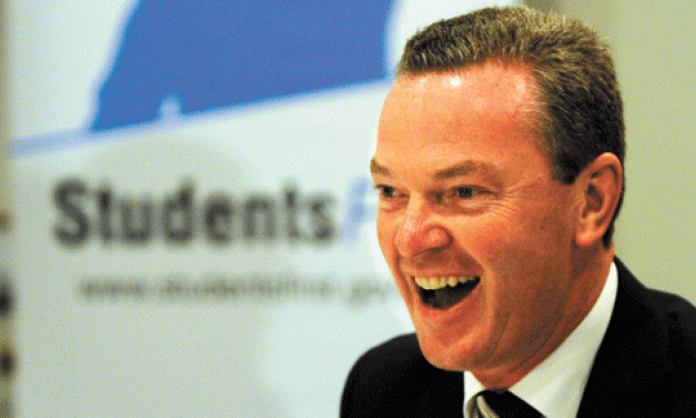Education minister Christopher Pyne is in danger of losing his seat at the next election. Polling shows a 15 percent swing against him – the second largest swing of all Liberal ministers. With a 50 percent disapproval rating, he is the most unpopular senior Liberal minister.
This is no small feat given the company he keeps. The fact that he is a pompous ruling class creep who goes about the business of screwing over workers and students with undisguised glee has played a not insignificant part in his soaring unpopularity.
But the ruination of Pyne’s reputation must be mainly attributed to the determined student campaign against his plans to turn the Australian education system into a carbon copy of the US’s.
The main way the government wants to do this is by deregulating fees, allowing universities to charge students whatever they want.
It also wants to give enormous handouts to private providers, lower the government contribution to HECS by 20 percent and increase interest rates on HECS repayments so that the cost of a degree will increase throughout your lifetime – which would result in poorer students paying considerably more for their education than their wealthier counterparts.
When announced in the May budget, these attacks were seen as some of the least problematic measures. An Essential poll at the time found that 43 percent of people opposed the deregulation of fees but 17 percent were unsure of what to make of it.
There has been a dramatic shift since then. Fee deregulation is now one of the most unpopular measures in the budget. Recent UMR data compiled by the NTEU shows that 69 percent of people oppose it.
The turnaround is due to high profile student demonstrations.
Both Pyne and Abbott have cancelled visits to some campuses, and special bodyguards have been assigned to protect key ministers from us.
Pyne has singled out Socialist Alternative as the main group giving him grief.
While we are proud to be the leading force behind many of the demonstrations, students have been joining the campaign all over the country. Alongside the many impromptu protests on campuses and TV shows, there have been mass demonstrations involving thousands of students. Students have also had a large and organised presence on other anti-budget protests.
Pyne is kidding no one when he claims that he inspires hatred only among left radicals. He is finding it increasingly difficult to muster support anywhere. On 11 July he tweeted: “Just spoke @ALSF [Australian Liberal Students Federation] conference @unimelb re higher ed reform. Students have digested our reforms and found them quite palatable”.
If “palatable” is the best that a Liberal minister can say of the reception they received at a Liberal conference, things can’t be going that well.
In fact, Pyne’s agenda is facing possible defeat. Until recently, some of his biggest backers were the vice-chancellors of the most wealthy and prestigious Australian universities, the Group of Eight.
They stand to gain immensely from a deregulated system. They previously made a submission to the government’s Commission of Audit, which foreshadowed the majority of the measures proposed in the budget.
But in light of the sustained opposition by students, some are now backtracking. In particular, many now openly oppose the proposed interest rate increase. They are lobbying frantically to have the setting of new fee rates deferred.
Even more significant than the changing stance of vice-chancellors is the fact that the Greens, the Labor Party and Clive Palmer have all promised to vote against the bulk of the attacks. If they hold firm, Pyne’s package will be defeated.
It was far from guaranteed that the opposition parties would take this position. In fact, the Labor government of the 1980s opened the door to deregulation of universities; the Gillard government pushed it wider and passed university funding cuts of $2.3 billion.
Again, it was the ongoing student mobilisations that made the difference. We still have a way to go, but this is a real victory for our movement. At the end of July, the Senate voted down a significant portion of the $2.3 billion cuts.
This shows that it is possible for the student campaign to win. Now, more than ever, we need to keep up the momentum. The beginning of semester two is an opportunity to organise more students on the streets and on our campuses in opposition to Pyne and his plans for education.
On Wednesday 13 August, the National Union of Students will hold “unhappy birthday” events all over the country to mark 46 inglorious years of Pyne’s time on earth.
The “unhappy birthday” celebrations will be the prelude to the main event the following week. On Wednesday 20 August there will be a national day of protest against deregulation.
The demonstrations fall a week before the Senate resumes to discuss the budget. We need to ensure that the menace of thousands of angry students looms large in the senators’ minds.









